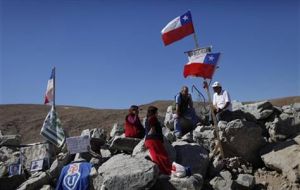MercoPress. South Atlantic News Agency
Piñera promises overhaul of mine safety legislation, standards and mechanisms
 The Chilean mining-safety regulator has 16 auditors for 4.000 mines
The Chilean mining-safety regulator has 16 auditors for 4.000 mines As some of its 33 rescued miners begin to go home, and as international interest in the story has yet to wane, Chile’s President Sebastian Piñera is promising a revision of “legislation, standards and mechanisms” to improve safety of miners in the country.
“This will be a very profound and significant change, so the lesson of the San José mine will never be forgotten,” Piñera told journalists outside the Copiapo regional hospital, where the 33 miners were taken following their dramatic rescue.
As of late Friday almost all miners were released from hospital after been examined by medical teams and deemed in good health.
Journalists waited outside the hospital as extended family members arrived to see their loved ones, most for the first time since the miners’ surfaced from 700 meters underground throughout Wednesday.
Luis Urzua, the beloved work boss, was the last miner to exit the famed Fenix 2 capsule around 10 p.m. local time. Among the few statements he made at the time, one was directed at the President, saying such an accident cannot happen again.
Thursday, Piñera said he had since spoken to the Urzua about the comment.
“The truth is no one can guarantee that an accident will never happen in our country,” he said. “But we can guarantee one thing, that never again in our country will we allow work in conditions to be this unsafe and this inhumane, like it was in the San José mine and like it is in many other places in our country.”
Piñera said an official announcement would be made in the upcoming days and gave a sole concrete example of the proposed changes —the tripling of Sernageomin’s budget.
Top officials from Sernageomin were fired and many small and medium-sized mines in the Atacama and Antofagasta regions were closed following the collapse of the San José mine on Aug. 5.
Sernageomin, the mine-safety regulatory body, has been criticized for having too few safety auditors for the country — 16 responsible for approximately 4,000 mines. In the Atacama region alone, where the miners were trapped, there are only four for the 844 registered mines in the area.
Jonathan Vega, the brother of once-trapped miner Alex Vega, said Chile is in desperate need for an improvement in safety standards in mining. Jonathan worked in the San José mine for five years between 2003 and 2008 and said a safety check was made once a year “if you were lucky,” he told The Santiago Times.
“We need more people to survey mines: one check per month, per mine, minimum”.
The San José mine had closed previously for safety concerns in 2007 but unexplainably reopened in 2008.
Piñera emphasized that a radical change would mean one in ”the culture of our country,” and mentioned it would apply to sectors such as agriculture, transport, fishing, and construction, in addition to mining.
In the week following the Aug. 5 accident, the government has said that safety reform in the country was underway, but to date has yet to release a formal proposal.
By Eva Salinas – Santiago Times




Top Comments
Disclaimer & comment rulesCommenting for this story is now closed.
If you have a Facebook account, become a fan and comment on our Facebook Page!